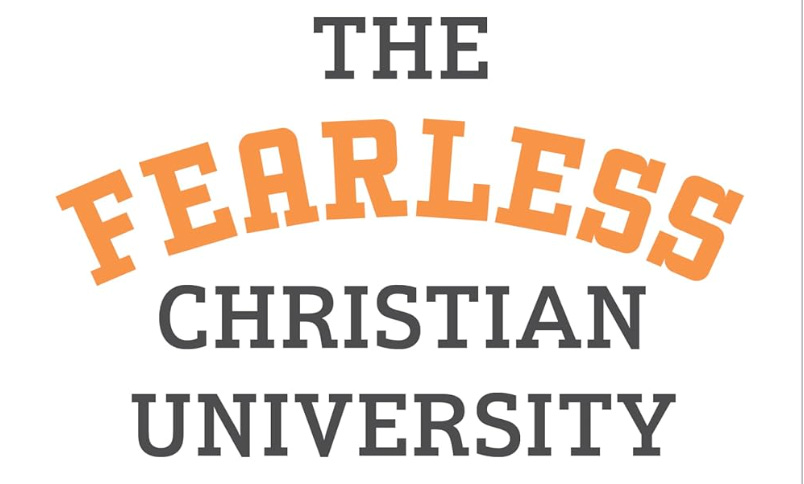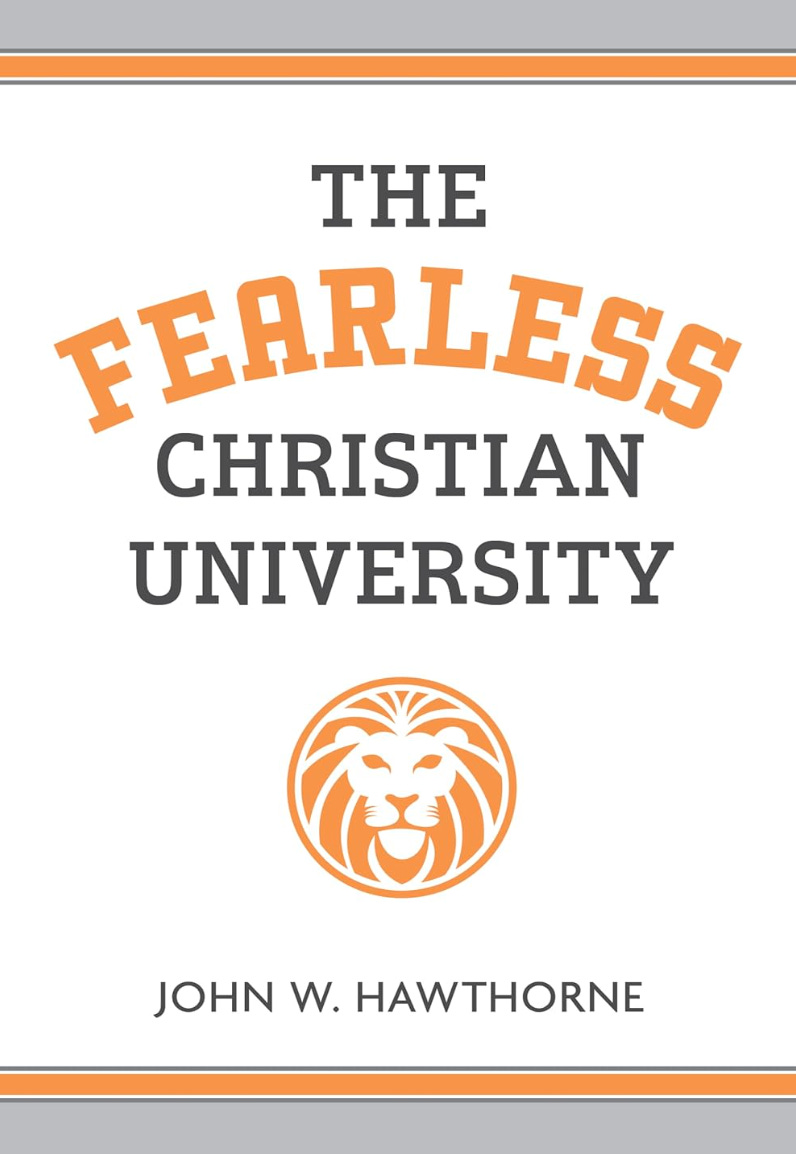I first heard of John Hawthorne through a friend who sends me links each week, and sometimes almost daily. Some of his links appear each Saturday in our Meanderings. Anyway, he pointed me often to John Hawthorne’s blog and now John’s Substack. I read John’s Substacks, and I hope you will, too.
I met John when I was giving a couple lectures at his Christian college, Spring Arbor. I gave two lectures, one in the afternoon and one in the evening. Kris and I enjoyed John’s and Jeralynne’s engagement in the topics of the lectures. Anyhoo, as they say in some corners of these blessed States, John has a new book out called The Fearless Christian University. I like the second word in his title, and that word shapes the first chapter of this new book. Before I get there, a bit about his Introduction. John has taught at Olivet Nazarene, Sterling College, Warner Pacific, Point Loma, and Spring Arbor – with thus a heavy dose of Wesleyan versions of Christianity. But he opens this book with this line: “I couldn't have written this book if I was still employed by a Christian university. I'm not saying that someone would have stopped me. However, it would have provided an opportunity for one of those ‘we just want to make sure you're still on board with our mission’ conversations. I had enough of those conversations without having to deal with what's in this book.”
All leading to his first chapter: The Limits of Fear.
I attended a Christian (of a fundamentalist, not neo-evangelical, sort) and then attended an evangelical, or neo-evangelical seminary. I agree with Hawthorne’s framing of the book with fear but not because I felt that fear-shaped context very often. But at times, when needed, it sprang into force. “Christian universities, much like the evangelical subculture that spawned them, are characterized by fear: fear of societal decline, fear of secular authorities, fear of apostasy, fear of not being ‘real’ schools. In short, they fear losing their way.”
Opposition to secular culture, Hawthorne observes, is essential in evangelical identity formation. The challenge, if I may, is to discern how to be “in” the world but not “of” the world. The boundary lines are fuzzy and are determined by those with the loudest voice at that moment. Thus, Christian “University leaders operate far too often out of concern that a boundary will inadvertently be crossed and, as a result, that their institution’s reputation will be damaged, donations will dry up, and the school will be characterized as ‘going liberal’.” Bingo. Hawthorne knows that some Christian universities/colleges today are taking a hard right turn to prevent those concerns being raised.
John Hawthorne has a proposal: “I am advocating for a fearless Christian university: an institution that understands its role in the higher education landscape, can articulate that position in meaningful ways, organize its people and programs in support of that mission, and become a laboratory for how people of faith engage the broader culture. There are numerous forces that mitigate against my vision, and many of the shifts that have occurred in Christian universities … may well have to be addressed if the fearless Christian university is to be seriously pursued.”
You may be asking what John has been asked and what I am asking, and what many of us have asked: who has the moxie, the capacity to withstand the pushbacks, and the courage to step into leading a school into this fearless Christian university in a day like ours? Hawthorne’s book has arrived at the right time, not because I think schools are looking for this proposal. No, it’s the right time because if not now, the fearless Christian university will become an unrealizable dream. If Christian university presidents do not stand up now to reverse the trend toward fundamentalist, Christian nationalist universities, there may be no schools left to lead into a fearless Christian university proposal.
The former oppositional stance, Hawthorne writes, is no longer possible. Professors have shifted from generalists to discipline-shaped professors. Administrators are increasingly detached from the classroom, from students, and from professors. The temptation to expand programming and to form into professional schools has been hard to resist. Christian School budget concerns have always precipitated one crisis after another. Denominational identity has decreased for students and institutions, and the old Christian (denominational) school became increasingly irrelevant. Social justice has become increasingly a major concern for students.
Thus, the status quo won’t work and fearmongering won’t either. “Donors, trustees, denominational leaders, and cultural gatekeepers tend to be older and more conservative than the faculty and students. Conflict is almost inevitable.” Christian universities used to be secretive; but social media has made them far more public than they had been. What happens on campus does not stay on campus. The rise of the Nones and Dones makes Christian universities far less attractive. Oppositional strategies complicate the already challenging situation. “The more, then, that Christian universities see themselves as oppressed by the broader society, the less will their position be understood by many Americans. This disconnect will, in turn, make them seem out of touch with society as a whole and likely to face scrutiny and disapproval from the culture at large.” Enter politics here.
The Christian worldview approach to Christian universities, then, has become less attractive. But Hawthorne thinks the real issue is fear, not worldview: “I submit that the heart of the distinction between Christian universities and secular schools is the fear of students losing their way. Perhaps they would be tempted by the (often imaginary) licentious lifestyle of secular schools, so we need campus lifestyle covenants. Perhaps they would drift away from faith once they have separated from family in their home, so we need Chapel services. Most importantly, they might be led astray by faculty members who attack Christianity, so we need careful hiring practices.”
Proposal: “fearless Christian universities would accept the internal and external shifts that have occurred and find ways of engaging those changes from a position of strength. They would be arguing for the special role they play in higher education period students, faculty, and alumni would be seen as vast resources to shape a model of the Christian university that speaks into a pluralistic society in profound and important ways.” They will need to be both Christian and higher education, not with the former overruling the latter. They will pursue truth in its complexity. He cites Parker Palmer: “Be not afraid” and “Don’t be the fear.”
“This is what a fearless Christian university does. It recognizes that addressing social change or hearing students’ concerns or living in true community is scary. Yet that fear does not get the last word. It is but the beginning of a liberating journey that truly engages the culture and stakes out a unique role for the Christian university in the sphere of higher education.”






Thanks, Scot. Would that college presidents and boards of trustees would take John's words to heart. I have not much hope of that; if anything, as he notes, there's a lot of retrenchment toward greater conservatism in many institutions, given the increasingly strong political alignments between Christianity and political conservatism. It's a very timely book.
Thank you Scott and John. This sounds spot on .